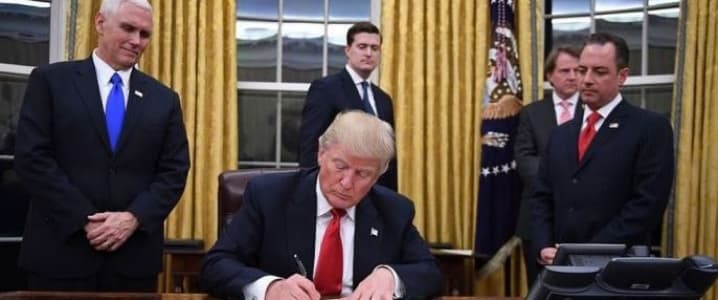This morning, Vice President Mike Pence stood 100 feet from North Korean soldiers in the Demilitarized Zone to declare his administration’s newest departure from established American foreign policy.
"We're going to abandon the failed policy of strategic patience,” Pence stated, situated in the middle of the Korean peninsula’s rivalling states. “But we're going to redouble our efforts to bring diplomatic and economic pressure to bear on North Korea. Our hope is that we can resolve this issue peaceably.”
Pence’s visit came just hours after U.S. and South Korean officials confirmed a failed missile launch by North Korea on Sunday following a showy military parade for the country’s Day of the Sun celebrations.
As pointed out by New York Times reporter David Sanger last month, President Donald Trump is perhaps better briefed about tensions with North Korea than any other international situation, likely due to a pointer from his predecessor President Barack Obama. The first month of the freshman politician’s agenda saw more meetings about the Asian showdown that any other single national security issue.
In the days leading up to the vice president’s visit, Trump’s tweets urged China, North Korea’s main international ally, to negotiate with Pyongyang regarding the country’s nuclear ambitions.
“I have great confidence that China will properly deal with North Korea,” the president tweeted, following a meeting with Chinese President Xi Jinping. “If they are unable to do so, the U.S., with its allies, will! U.S.A.”
Trump’s message reverberated in foreign and American news media. U.S. “allies” in East Asia – a category dominated by Japan and South Korea – had been incorporated into hinted military action, presumably without prior consult. Related: Who Holds The Power In Today’s Oil Market?
American foreign policy since the Korean truce of 1953 has been to support the existence of the DMZ to prevent direct conflict between the fiefdom of the Kim family and one of the most vibrant economies in all of East Asia.
The capital of said economy, Seoul, sits right next to the demilitarized zone, making any nuclear “solution” to the North Korean regime detrimental to the livelihoods of millions in the region. The economic carnage of a non-nuclear “mother of all bombs” (MOAB) attack—akin to the one carried out in Afghanistan last week without Trump’s direct authorization—on the Korean peninsula would pale in comparison to the massive loss of innocent North Korean lives.
President Trump has been getting increasingly friendly with U.S. military weapons systems over the past couple of weeks. The president’s authorization of a 59-missile attack on Syrian President Bashar Al-Assad airfield created somewhat of a media frenzy that included an interview at the Fox Business Network, in which President Trump stated that all 59 missiles “hit”, while General Joseph Votel, who heads U.S. forces in the Middle East, confirmed that only 57 hit the mark.
Less than a day after the attacks, Assad used the attacked airfield to launch strikes against his regime’s dissenters – counteracting Trump’s claims that the operation had been a success.
This failed military action by the new administration makes the escalation of tensions with North Korea even more concerning, as outlined by a flurry of expert opinion on the peninsula’s pains.
Some called for the continued support of Seoul against Pyongyang, but without the belligerent use of social media that could instigate inadvertent military mobilization.
“It would be risky for Mr. Trump to let overconfidence and bombast, expressed in tweets and public statements, box him into some kind of showdown with the North’s ruthless leader, Kim Jong-un, who has displayed similarly macho traits,” The New York Times Editorial Board said on Monday. “South Korea, Japan and even Russia have urged both sides to avoid a devastating miscalculation.”
Others suggested an abandonment of South Korea, in favor of spending time and manpower to develop stronger relationships with the rest of Asia. Related: Iran Ready To Join OPEC’s Production Cut Extension
“The Korean Peninsula has lost its geopolitical significance, South Korea its helplessness and America’s Korea commitment its purpose,” Doug Bandow of Foreign Policy, claimed in his opinion piece for Foreign Policy last week. “While there is much to criticize in the approach of Donald Trump's administration to the rest of the world, the president correctly sees the need for a foreign policy that more effectively protects America's interests.”
ADVERTISEMENT
Bandow points to the U.S.’ outdated presence in South Korea as a key cause of the country’s stagnant military prowess. If American forces were to withdraw, it would push Seoul to develop its defense and return the status of the Korean conflict to a local dispute, instead of the superpower struggle with China it has become. The nuclear concern with “irresponsible” North Korea would likely be curtailed by Beijing, which is equally as unenthusiastic towards Pyongyang’s nuclear program as is Washington.
North Korea’s response to Pence’s posturing so close to the DMZ remains to be seen. As of this article’s writing, the DPRK news service’s Twitter feed still boasts the national elections’ “100 percent legitimacy,” compared to the constitution-altering polls in Turkey that were “marred by graft.”
The ball remains in North Korea’s court.
By Zainab Calcuttawala for Oilprice.com
More Top Reads From Oilprice.com:
- Attack On Syria: U.S. Has Returned To “Business As Usual”
- 2020s To Be A Decade of Disorder For Oil
- Why Oil Markets Are Not Recovering Much Faster



















USA has amazing technology. Modern artillery is mobile, accurate to one meter on the first shot. Able to calculate the destination and shoot the origin of an artillery round before it lands. Anti missile technology is more impressive yet.
China declared the Korean peninsula must be nuclear free. The way is clear to attack North Korea and pull the little dog's teeth.